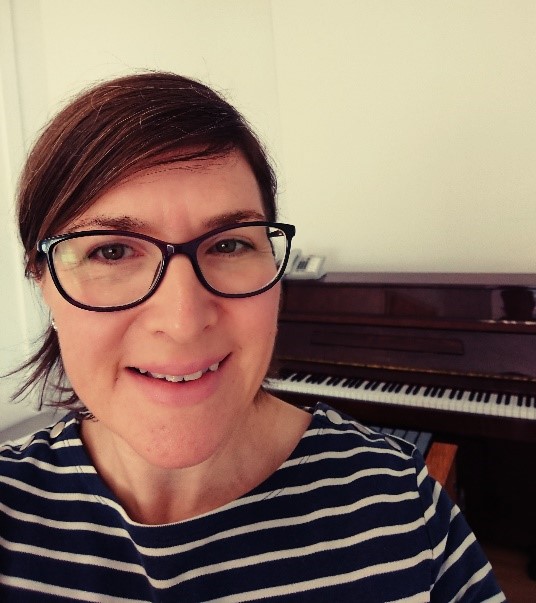My name is Joy, and I am a music therapist. I have worked as a music therapist since 1999, in a range of settings – in education, learning disabilities, mental health, neuro-disabilities and with older adults.

Joy Rickwood - Music Therapist
Since 2010 I have been a member of the Learning Disability Arts Therapies Team at Aneurin Bevan University Health Board (ABUHB), and since July 2020 I have had the privilege of leading the same team which comprises of a Dramatherapist, Art Psychotherapist and Music Therapist. We are supervised by a Dance Movement Psychotherapist, so all the areas of Creative Therapies are represented.
What can you tell us about your role as a music therapist?
We are a specialist service providing tailored art therapy to adults with learning disabilities, living in Gwent. The reasons for referral are varied, but include high levels of distress, anxiety, low mood, complex grief and loss, relationship issues, transition and mental health issues.
We work closely with multidisciplinary teams to inform the care, hear the voice and wishes of the individuals to provide the best support. We aim to hear and empower the individuals we work with – using creative methods to process their thoughts and feelings, enabling them to make informed choices about their lives.
As a music therapist I use music in many forms to form a therapeutic relationship. This includes shared improvised dialogues, song writing, use of recorded music, and basic music technology. My work includes one-to-one and group work, as well as offering advice and consultation to staff groups, or upskilling existing carers so that they can use music in daily life with individuals they support to enhance their existing working relationships and improve quality of life.
Are there are other areas you are involved with?
Here at ABUHB, we meet regularly with other arts therapists across the health board who work in Older Adults and in Adult Mental Health teams, as well as at the Serennu Childrens Centre. This informs our work and creates opportunities for sharing and development.
I am one of three music therapists in the health board trained in Neurologic Music Therapy, and these techniques can be helpful in other areas such as acquired brain injury and falls clinics. I also recently trained as a singing for lung health facilitator and these techniques are useful with people with chronic lung disease.
I am a community choir leader outside my NHS work, and a member of the Natural Voice Network, so whenever possible I bring singing opportunities into my work. We are involved in the Arts in Health and Wellbeing work on creating a strategy in ABUHB and are in touch with third sector groups who offer creative arts activities in the health board. I also have a passion for supervision and the supervisory process and founded the British Association for Music Therapy Supervision Network – facilitating for 6 years. This has become a helpful forum for skill sharing and CPD and has been a delightful and rich resource to me.
What is the best part of your job?
The best part of my job is seeing the work of the team flourish in so many rich and diverse ways as the team members and individuals referred work together to create new ways forward with such creativity. I still love to work with individuals therapeutically, and so being able to see change emerge on a one-to-one basis, and systemically within our directorate and beyond is a joy on a micro and macro level. We are lucky to be able to host students on placement with our team, and this is also such a privilege – to see their processes as they navigate the work and bring their own skills to bear – with positive outcomes.
What made you choose this career path?
I chose this career because I met a music therapist when I was 13, and it appealed to me. I loved music and enjoyed working with people, but I had questions I wanted to find answers for, and so the process of becoming a music therapist was quite a healing one.
I was lucky to go on a work experience placement with a music therapist at the age of 16 and was privileged at that time to have the support needed for the musical and academic training to take steps towards training as a music therapist.
I have never regretted the choice – the profession continually demands learning, growth and acceptance of what I can bring to the work, and above all the honour of meeting others therapeutically with the music is the best of all.
What are your hopes for the future?
I hope to continue to sustain and develop the work of the Learning Disability Arts Therapies team, and to keep up my musical and theoretical skills. It would be great to see a growth in the use of arts therapies across the health board, building existing resources and raising awareness.

